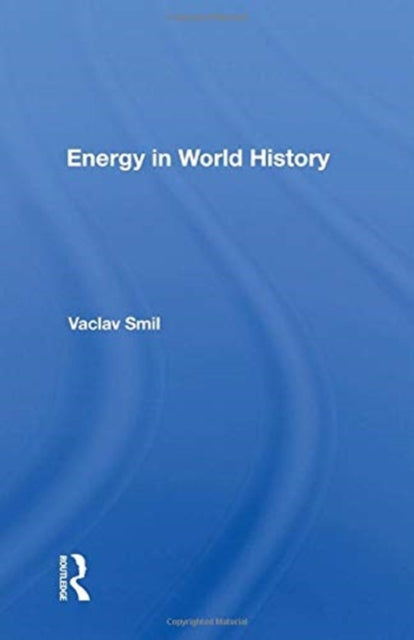Vaclav Smil
Energy In World History
Energy In World History
YOU SAVE £2.26
- Condition: Brand new
- UK Delivery times: Usually arrives within 2 - 3 working days
- UK Shipping: Fee starts at £2.39. Subject to product weight & dimension
Bulk ordering. Want 15 or more copies? Get a personalised quote and bigger discounts. Learn more about bulk orders.
Couldn't load pickup availability
- More about Energy In World History
This book explores the historical significance of energy, from human muscle power to modern fossil fuels, in shaping world history.
\n Format: Paperback / softback
\n Length: 300 pages
\n Publication date: 19 October 2020
\n Publisher: Taylor & Francis Ltd
\n
This book provides a comprehensive exploration of the profound impact of energy on the course of human history, spanning a vast spectrum of historical periods and technological advancements. From the earliest days of human civilization, where our ancestors relied on the strength of their bodies to forage for food and harness the power of animals for agricultural purposes, to the emergence of preindustrial hydraulic techniques and the subsequent advent of modern fossil-fueled civilization, energy has played a pivotal role in shaping our world.
Within this comprehensive narrative, the author delves into the intricate relationship between energy and society, examining how different forms of energy have influenced the development of human civilization, economic growth, and environmental sustainability. The book explores the various energy sources that have been employed throughout history, including human muscle power, animal power, wind power, water power, and fossil fuels, highlighting their advantages and disadvantages.
Moreover, the author examines the historical and cultural significance of energy, exploring how it has shaped social structures, technological advancements, and artistic expressions. From the construction of ancient monuments to the power of steam engines and the emergence of the electric grid, energy has been a driving force behind the progress and innovation of human society.
Furthermore, the book raises important ethical and environmental concerns associated with the use of energy, emphasizing the need for sustainable practices and the responsible management of our energy resources. The author offers insights into the potential benefits of renewable energy sources, such as solar, wind, and hydroelectric power, and explores the challenges and opportunities associated with their adoption on a global scale.
In conclusion, this book offers a comprehensive and insightful examination of the role of energy in world history, providing a valuable perspective on the past, present, and future of our energy-dependent world. Whether you are interested in history, technology, or environmental sustainability, this book will provide you with a deeper understanding of the complex and interconnected relationship between energy and society.
This book provides a comprehensive exploration of the profound impact of energy on the course of human history, spanning a vast spectrum of historical periods and technological advancements.
From the earliest days of human civilization, where our ancestors relied on the strength of their bodies to forage for food and harness the power of animals for agricultural purposes, to the emergence of preindustrial hydraulic techniques and the subsequent advent of modern fossil-fueled civilization, energy has played a pivotal role in shaping our world.
Within this comprehensive narrative, the author delves into the intricate relationship between energy and society, examining how different forms of energy have influenced the development of human civilization, economic growth, and environmental sustainability. The book explores the various energy sources that have been employed throughout history, including human muscle power, animal power, wind power, water power, and fossil fuels, highlighting their advantages and disadvantages.
Moreover, the author examines the historical and cultural significance of energy, exploring how it has shaped social structures, technological advancements, and artistic expressions. From the construction of ancient monuments to the power of steam engines and the emergence of the electric grid, energy has been a driving force behind the progress and innovation of human society.
Furthermore, the book raises important ethical and environmental concerns associated with the use of energy, emphasizing the need for sustainable practices and the responsible management of our energy resources. The author offers insights into the potential benefits of renewable energy sources, such as solar, wind, and hydroelectric power, and explores the challenges and opportunities associated with their adoption on a global scale.
In conclusion, this book offers a comprehensive and insightful examination of the role of energy in world history, providing a valuable perspective on the past, present, and future of our energy-dependent world. Whether you are interested in history, technology, or environmental sustainability, this book will provide you with a deeper understanding of the complex and interconnected relationship between energy and society.
\n Weight: 476g\n
Dimension: 152 x 234 x 24 (mm)\n
ISBN-13: 9780367158798\n \n
This item can be found in:
UK and International shipping information
UK and International shipping information
UK Delivery and returns information:
- Delivery within 2 - 3 days when ordering in the UK.
- Shipping fee for UK customers from £2.39. Fully tracked shipping service available.
- Returns policy: Return within 30 days of receipt for full refund.
International deliveries:
Shulph Ink now ships to Australia, Belgium, Canada, France, Germany, Ireland, Italy, India, Luxembourg Saudi Arabia, Singapore, Spain, Netherlands, New Zealand, United Arab Emirates, United States of America.
- Delivery times: within 5 - 10 days for international orders.
- Shipping fee: charges vary for overseas orders. Only tracked services are available for most international orders. Some countries have untracked shipping options.
- Customs charges: If ordering to addresses outside the United Kingdom, you may or may not incur additional customs and duties fees during local delivery.


